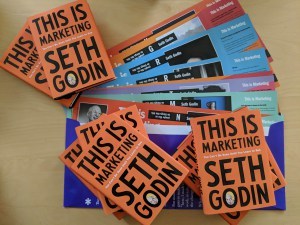Seth Godin's Blog, page 26
November 27, 2018
Is there a marketing person leading the IT team?
Because the IT team is interacting with your customers. And they call them users. Or ignore them.
The local bank, for example, decided that adding a seventh and eighth digit to its two-factor authentication system would make it more secure (it’s a vanishingly small difference, but that’s a story for another day.) I’m sure that they didn’t consider the cost to the thousands of customers who will use it millions of times of day. Remembering 43948394 is very different than remember 439234.
Or consider this note from the TTP website:
“Please remember to revisit our website for your application status updates. Notification of when you may schedule an interview appointment (if one is needed) will only be posted here.”
Check back when? How often?
While it might be more convenient for them to forego sending out some sort of email or text alert, it’s definitely a fraught moment for the customer, the paying customer who is either going to forget, or not read this at all, or miss the appointment…
Marketing used to be advertising.
Now, marketing is everything you do. And what you do either adds to the experience or takes away from it.
If your company lives and dies by software, where are the marketers on your software team?







November 26, 2018
String too short to be saved
Poet Donald Hall told the story of a hermit in New Hampshire, a man who passed away leaving behind sheds full of hoarded stuff.
In one of the sheds was a box labeled, “string too short to be saved.”
That’s what we do with the trivia that gets in the way of our best work. The tiny slights, the small rejections, the bumps in the road that could be easily forgotten. Ideas too useless to be saved.
But we save them nonetheless.
This is the cruft that keeps us from moving forward.
What happens when we treasure the memories that serve as fuel, and ignore the rest?







November 25, 2018
Where’s the edge?
The world is not flat.
The easiest way to demonstrate that is with a simple question, one that challenges unexamined belief with the need to understand how things work. If it’s flat, there’s an edge. Where is it?
Once we understand how things work, we have a chance to interact with them. Not with memorization or rote or politics, but with practical effort.
First, though, we need to understand the mechanism.
If you want to take a hot shower, it pays to turn the hot tap on all the way until the water gets hot, then adjust the cold to end up with something comfortable.
That’s because the water that’s supposed to be hot, the water that’s stuck in the wall between the shower and the hot water heater, is cold. Once you flush out that leftover cold water, you’ll see the hot water arrive.
You don’t have to be a plumber to understand the system, you simply have to be curious. And willing to test to see what works.
The sun rises every morning. That doesn’t happen because the sun moves. It happens because the sun mostly stays still and the Earth rotates on its axis. No need for human sacrifice or much in the way of hope to see the sun rise again tomorrow. This used to be so controversial that it was seen as a matter of life and death. But once you understand the system, you can see that it is without controversy.
Too often, we take the lazy way out and teach our kids to memorize the status quo instead of challenging them to understand how the world works.
Too often, when the world around us changes, it’s convenient to stop looking for the edge, to blame the outcomes and fail to do the work to understand the system. We take the system for granted in every element of our lives, from our work to our morning shower.
The most pressing example: Climate change isn’t political unless we make it so. It’s everything around us and the world we live in, and understanding it is more urgent than ever.







November 24, 2018
Denying the heart
If you want to annoy someone with back pain, tell them it might be in their head.
And if you want a medical practitioner to feel disrespected, you might try bringing up the placebo effect and how it’s often more effective than ‘real’ medicine.
Engineers and marketers often get stressed when we talk about emotion and dreams instead of rfps, features and benefits…
The thing is, we’re not automatons, computers making Vulcan-like decisions.
And that’s okay.
It’s better than okay. It permits us to bring heart and soul and magic to our work.
Instead of feeling disrespected because you’re seen as working with human emotions, perhaps it’s worth realizing that it’s a rare privilege, one with unlimited leverage and responsibility.
[Tomorrow is the early-decision deadline for the altMBA. Preference is given to those that care enough to commit early. Hope you can join us.]







November 23, 2018
An inconvenient shopping list
Cyber Monday (inspired by its evil cousin, Black Friday) is a symptom of our obsession with convenience. As Tim Wu has pointed out, convenience trumps privacy, morality and good judgment for too many of us–the internet has made things faster, and faster has become faster, and faster has become the point.
Here’s a list of some gifts and expressions of friendship that aren’t nearly as convenient, that involve independent sellers and crafters and that you have plenty of time for if you plan ahead…
Starting close to home, consider the This is Marketing 8-pack, with custom covers, from 800 CEO Read.
For the baker in your life, this grain mill is a game changer. Now you can buy local rye, wheat or other grains and grind and bake fresh. I like the Komo, which you can get from Pleasant Hill.
Also for anyone with an oven, a sheet of 1 foot by 1 foot steel for your oven will totally change the way you make pizza or almost anything else, even if you go with the convenient path and buy frozen. In the EU or the US, or you can save some money by seeking out a local sheet steel supplier.

A handmade knife from Japan is an heirloom waiting to happen. Korin is a reliable place to start. And there are local artisans making beautiful knives everywhere.
Your local favorite restaurant also sells gift certificates. Who knew? What a great excuse to treat a friend to dinner and conversation. (Local bakeries too).
Do you have a friend who doesn’t like chocolate? If so, get new friends. For the rest of us, there’s Shawn Askinosie and his mission to make the delicious ethical.
Not enough people carry an official Star Trek communicator in their pocket.

If you give someone a box of beautiful custom stationery, they’ll send more beautiful handwritten notes. A gift that truly keeps giving.
Plan (far) ahead and grow some heirloom plants. Or give the seeds as a gift.
Books, blankets and t-shirts that contain the entire text of a book. Litographs even has The Princess Bride by the late William Goldman.
Peeps are an extraordinary device, one that every human with a pair of eyeglasses will be blown away by. And at $15, you’ll be thought of every day of the year… Buy extra, they have a habit of being borrowed.
Rubber chickens are always a crowd pleaser.
Finally, a trend that’s starting slowly but is gaining traction is the idea of giving a gift on behalf of someone you care about to a cause that matters. Perhaps one that’s not glamorous, convenient or easy, but important nonetheless. Consider any of these dozens of worthy causes, vetted by the extraordinary Jodi Spangler. (Click and scroll down to see the list).
Here’s to the difficult, time-consuming and inconvenient.







November 22, 2018
The race
That place you’re going, at breakneck speed, the one that requires shortcuts, hustle and compromises…
What will happen when you get there?
—–
Thanksgiving is my favorite holiday. No matter where you live, it’s a chance to forgo the usual drama and instead focus on the people around us and the opportunities we have. Possibility fuels us, and our relationships give us the foundation to make a difference.
I’m grateful to each of you, and so many others who have worked so hard to make things better.
Enjoy the day.
PS tonight’s a great night to use the free Thanksgiving Reader.







November 21, 2018
Diagnosis
The easy way to figure out the problem is to try the treatment. If the treatment works, you probably had the problem the treatment was there to fix.
But that’s dangerous, expensive and time consuming.
It’s a lousy way to consult, to coach or to do medicine.
Smart diagnosis leads to more commitment when the treatment is offered.
It’s more difficult, but it might be worth the effort. We look for professionals who can use effort and experience to be able to diagnose something without poking around, treating things in the dark.
PS tomorrow is the US celebration of Thanksgiving. As always, we’re delighted to share The Thanksgiving Reader, a free family tradition that’s been used by more than 100,000 people to date. I hope you and your family will give it a try this year.
Have a happy and healthy one, no matter where you live.







November 20, 2018
Avoiding the curse of the low-hanging fruit
A new organization launches and finds excited and willing customers.
These are the early adopters. The nerds. The people who knew they had a problem. These are the easy sales, the folks who will wait in line.
And then the curse can set in.
You will certainly exhaust this group. Too many competitors are seeking them, and you’re running out of places to look.
At this point, you can make the choice to move to a new town or a new submarket and begin again, finding more geeks who can’t wait for what you’ve got.
And if you can keep it up, you can do great as the ‘new one’.
But for many, this is how you die in the chasm.
Sooner or later, you’re going to run out of the early adopters. Probably sooner. Suddenly, your cost per customer goes way up. Suddenly, you’ve shifted from keeping up with demand to running on fumes.
That’s because you ran around too much. You spread the core market too thin and never did the hard work of figuring out how to change the culture, which was your goal all along.
I’ve seen this firsthand with social entrepreneurs. They bring an innovation to a village, sell it (a clean bathroom or a solar lantern or a new, better sort of seed) and then, when the easy sales are done, move on to the next village, figuring that it’ll all work out.
There are two alternatives:
acknowledge that you are in the business of serving the early adopters. Make something for them and then, when it fades, make something else for them.
acknowledge that you are trying to reach for more, to transform the market.
If that’s the case, don’t leave the first village. Stick around and stick around and stick around. Create enough energy and value that your core customers can’t help but spread the word. Not only spread the word, but insist that their peers come along.
The best way to move beyond the low-hanging fruit is to discipline yourself to not run to the next tree. Get a ladder instead.







November 19, 2018
Signal to noise ratio
It’s almost impossible to have a substantive conversation at a soccer match. It’s too loud. Too much noise.
It’s exhausting to listen to some politicians speak, because there’s nothing being said. Not enough signal.
Signal to noise ratio is the measure of how much cruft we have to work through to get to the heart of the message.
The discussion to have when your message isn’t getting out is: Is the world too noisy, or is our signal too weak?
The internet is the noisiest communication medium ever developed at scale. And often, it has vanishingly small signal as well.
When you give everyone a microphone, they might surprise you by using it, even if they don’t have much to add.
One solution is to find a quiet space when you have something to say. Now (in this loud place, filled with spam) might not be as good as later, in a setting you’ve earned, saying something you care about, to people who are listening.
Cut down your noise, improve your signal.
PS updates on This is Marketing, including news about our launch party, can be found here.







November 18, 2018
The digital divide is being flipped
A generation ago, there was a real worry: privileged parents, those with time, education and money, were giving their kids access to the tools of the net while other kids were missing out on the wealth of interactions and information available online. The fear was that this gap would further magnify differences in opportunity.
Today, as digital tools get cheaper and more widespread, a new gap is appearing:
If a parent uses a tablet or a smartphone as a babysitter, it’s a lot easier to get a kid to sit still. As a result, parents who are busy, distracted or can’t afford to spend as much 1:1 time as they’d like are unknowingly encouraging their kids to become digital zombies, with a constant need for stimulation, who are being manipulated by digital overlords to click and click some more.
If a kid can’t read, it’s not clear he should be surfing the web, watching TV or playing a videogame for hours a day.
Boredom, daydreaming, a good book, building in three dimensions, interactivity with other humans–these are precious skills, skills that are being denied kids that are simply given a plate of chicken fingers and a tablet instead.







Seth Godin's Blog
- Seth Godin's profile
- 6546 followers











